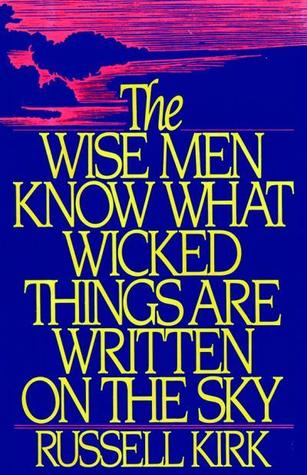Wise Men is a collection of 11 lively essays by the wise old sage who is contemporary conservatism’s most able prophet. The Kirk neophyte will find these essays most alluring; it is unusual to experience such an affirmation of the “permanent things” in our current age. The Kirk devotee will find this slim volume to be an encapsulation of a lifetime against the tide of the leveling influences at work in modern thought.
The book is a compilation of public lectures delivered at The Heritage Foundation from 1982-1984; while Kirk’s lectures are masterpieces in printed form, the reader can easily recognize they were intended for a live audience. Like his previous collection of Heritage lectures, Reclaiming a Patrimony, this assemblage has a theme: all is not lost. Departing from the view of his old friend Richard M. Weaver, Kirk holds that in the dark tunnel, some light glimmers, however dim. Through his many seminars at his home in the hamlet of Mecosta, a coterie of former assistants, and lectureships, Kirk has instilled the value of redemption. Even as the weary walls begin to crack, renewal may come. Kirk, like Joad and others, believes the West is growing more decadent day by day, and that we have “lost the object.” Our appointed civilizing mission, fatum, has exerted less and less influence, and like Rome, our population and prosperity could disappear and frustration would replace national confidence.
In the first three essays in this collection Kirk attempts to offer a vision of hope—specifically, a refining of the idea of America’s mission and an examination of the prospects for an American Augustan age. He demonstrates the need to recover this mission, but not as it has been interpreted by the neoconservative forces that abound in the Department of State and in numerous think tanks. Kirk accepts the Boorstinian perspective that the American Constitution cannot be exported, as it grew out of a special intellectual and historical experience. The legions of neoconservatives have made it appear as if conservatives endorse unabashed worldwide plebiscitarian democracy accompanied by a Novakian economic order; Kirk counters by repeating Sir Herbert Butterfield’s warning against national self-righteousness—”the cardinal error in diplomacy.” The American mission, according to Kirk, is to “reconcile liberty with law.” A Pax Americana could be produced not by promoting a pale hegemony, but presenting an example of ordered freedom.
Five of the 11 sections deal with educational processes; however, they are too eclectic to be united by an overall theme. The essays range from a seminal essay on the needed coexistence of order and freedom in the university to a rather acerbic attack detailing how computers limit the moral imagination. This reviewer, knowing Kirk’s environs well, finds the tone of this particular essay overly stringent, especially since Kirk has succumbed recently to the use of electric typewriters. But the point he makes is important: the Knowledge Society will be replaced by an Information Society and the “tested tools of learning” will be discarded. The panaceas proposed by educationalists all too often become their own worst nightmares.
Russell Kirk’s many lectures on virtue, including the one offered in this volume entitled, “Can Virtue Be Taught?” have not gone unnoticed by the able souls attempting to regain the educational high ground. Endeavoring to prove that virtue can be perpetuated, Kirk sides with Aristophanes instead of Socrates. The great hero-poet believed virtue, as the greatness of the soul, could not be acquired by pampering or tutorials, but was a natural phenomenon. The source of virtue, according to this argument, is the family; the recovery of virtue in America depends on our revival of this institution.
The remaining three essays address the problem of the family, the movement towards an age of sentiments and a concluding essay bearing the book’s title. Once again Kirk encounters the affliction of decline. Unlike Goethe, Kirk does not believe “the current times are the worst of times” and refuses to submit to the twin vices of servitude and boredom. Kirk elegantly defends the concept of the moral imagination, initially espoused by Edmund Burke in his Reflections. Through the moral imagination we realize that we are simply on the shoulders of those generations—part of a “folk chain”—that passed before us; we are, in part, a product of intuition. As the essay notes, ideology is the major obstacle to a revival of the moral imagination. Ideology can be countered, relying in no small part on the American disdain for dogma; three-quarters of a century ago Santayana wrote that it would take much hammering to drive an ideology into America.
Wise Men will serve as a reminder to those of a conservative cast to continue the effort to defend the civil social order against its many enemies. The lectures presented here were given over a broad span of time and there is a good bit of redundancy. Some of Kirk’s suggestions concerning education were originally espoused in his Decadence and Renewal a decade ago. His frequent references to Newman’s concept of the “habit of mind” will also strike some readers as repetitive.
Yet, at the end of the day. Wise Men is another valiant effort by Kirk to help us bring ourselves out of our current disorder and “refute the prophecies of decadence.”
[The Wise Men Know What Wicked Things Are Written on the Sky, by Russell Kirk (Washington, DC: Regnery Gateway) 138 pp., $17.95]

Leave a Reply